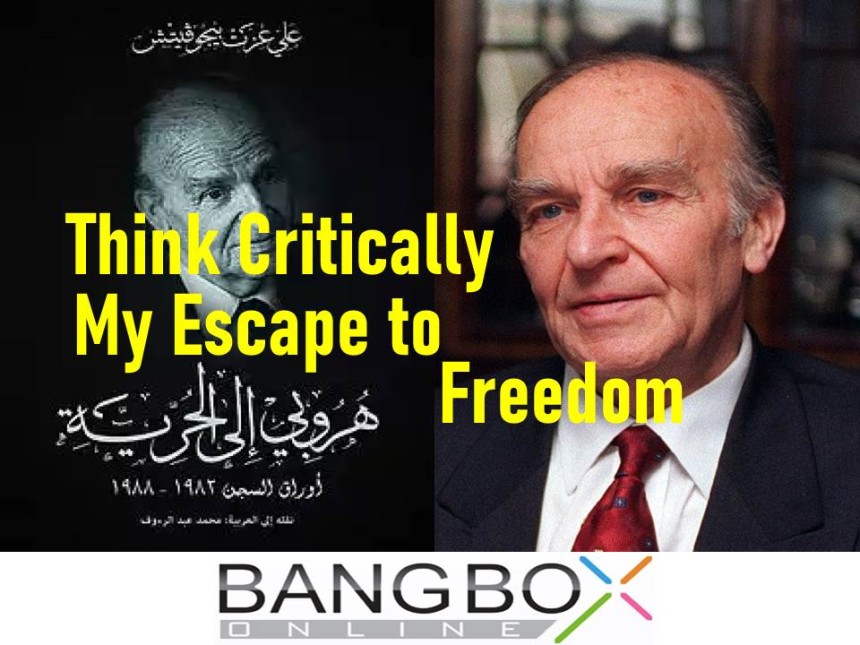
Think Critically: "My Escape to Freedom"
Alija Izetbegović (1925-2003) is one of the important figure, inscribed into history as a leader of Bosnian Muslims, an exemplary statesman and an intellectual of both his own country and the other Islamic world. He was the first republican president of Bosnia and Herzegovina after the end of the terrible war in Bosnia. Bosnian political activist and Islamic philosopher, author of several books. This write up is about his famous book ""My Escape to Freedom", where he invites Muslims of the East to Think Critically.
Think Critically: "My Escape to Freedom"
Alija Izetbegović (1925-2003) is one of the important figure, inscribed into history as a leader of Bosnian Muslims, an exemplary statesman and an intellectual of both his own country and the other Islamic world. He was the first republican president of Bosnia and Herzegovina after the end of the terrible war in Bosnia. Bosnian political activist and Islamic philosopher, author of several books, the most important of which is “Islam between East and West,” and the second book is "My Escape to Freedom". In this book he invites Muslims of the East to Think Critically.
He was born in the Bosnian city of Bosana Krupa, to a Bosnian family ancient in Islam, and his family name extends back to the days of the Turkish presence in Bosnia. The "beg" syllable in his family name is the local pronunciation of the Ottoman surname "bey", and his surname "Izetbegovic" means "Ali bin Izzat Bey".
He studied in the schools of the capital, Sarajevo, and graduated in law from her university. He worked as a legal consultant for 25 years, then retired and devoted himself to research and writing. Alija Izetbegovic grew up at a time when Bosnia and Herzegovina was part of a kingdom ruled by a liberal family, and Islamic education was not part of the school curriculum. While still a young man, Alija Izet Aware of the importance of learning about his religion and reading it extensively, he and some of his schoolmates agreed to establish a school club or association for religious discussions, which they called “Maladi Muslimani,” meaning “Young Muslims,” which later developed and was not limited in its activities to meetings and discussions, but rather extended to... Social and charitable work, and a special section for Muslim girls was established,
This association was able - during World War II - To provide effective services in the field of sheltering refugees, caring for orphans, and alleviating the scourge of war. In addition to these activities, the group’s programs included a program for character building. It is certain that the group’s trends and development towards integration and maturity were the result of its continuous endeavor to improve itself, and the attempt to benefit in its work from the knowledge it has attained. Through her own analyzes and diligence, in addition to being influenced by other ideas brought by some Bosnian students who studied at Al-Azhar University.
When Nazi Germany occupied the Kingdom of Yugoslavia and turned it into a fascist republic, the Young Muslim Association boycotted the fascist regime. This act upset the regime, depriving it of legal legitimacy. In the former Yugoslav Republic under its powerful leader Tito, Begovic was a prominent oppositionist, imprisoned several times during Tito's reign, and often accused by Serbian and Croatian parties of being a "supporter of Islamic fundamentalism."
Bosnia and Herzegovina, where Izetbegović lived, is a country in the Balkan geography, the Ottoman state left in the middle of Europe. This geography and its people were intimidated and were forced to remove from their core values during and after the Second World War, as communism became a dominant ideological and political regime in the region.
In this process, Izetbegović is considered as a highbrow and an activist trying to keep the Bosnians alive in the society with dynamics of Islamic civilization, fought hard to prevent social corruption, and even paid the price for his actions both materially and spiritually. He took the lead in the struggle against the political and social problems the Bosnian, the Balkan people faced, and tried to struggle by democratic means through the Young Muslims Movement (Mladi Muslim) he founded with his friends. He started his organizational attempts at the age of 16. While continuing his education as a law student and practicing as a lawyer, he wasn’t indifferent to social problems; therefore, he was in constant action.
Alija's organizational aspect was not limited to the Mladi Muslim, in addition, he founded the Democratic Action Party when she was 65 years old (1990) and was elected the first President of Bosnia and Herzegovina in the first election in Bosnia and Herzegovina, one of the seen members of the Yugoslav Federation. Despite known for his political identity, Izetbegović is also a philosopher, activist, sociologist, writer with his ideas on many issues. With his strong and personable stance and personality, he became a model for all lifestyles and is known as an exemplary personality among Muslims of the world, especially with his Islamic religious understanding, his ideas on political sociology, sociology of religion and society.
Begovic assumed the presidency of the Republic of Bosnia and Herzegovina from November 19, 1990 AD to 1996 AD, and then became a member of the Bosnian Presidency from 1996 AD to 2000 AD.
He resonated a message to the world with his intellectual and social works, with his ideas about the existence of an individual and society, Izetbegović made his objections to the wrong models of religion and social issues in Islamic geographies. It is seen that İzzetbeovic touches on these mistakes from different aspects and offers alternatives, and deals with social relations and values from an Islamic point of view. His views on social life are theologically based, puts the concept of 'morality' at the center of his philosophy of life.
By presenting views on the indistinguishable relationship between religion and morality, he considers the phenomena of religion and 'morality' ontologically and sees these two phenomena as inseparable parts. Contrary to some scientists considering the phenomena of morality and religion as different phenomena and make definitions accordingly, Izetbegović opposes the interpretation of these two concepts as separate phenomena and sees one as an equal part of the other.
Through document analysis, one of the qualitative research methods, Alija Izetbegović's books such as Islam Between East and West, Problems of Islamic Rebirth, Islamic Declaration, My Witness to History, My Escape to Freedom and other sources on the subject have been examined, and his determinations on the relationship between religion and morality are discussed in this article. Limiting his views based on Islamic belief in the axis of the Qur'an, Izetbegović makes definitions for religion and morals and tries to prove the inseparability of both notions so, he considers religion and morality as a whole.
Therefore, in his unique point of view, he alleges that a moral understanding that is not based on religion is not suitable for human nature. Based on the concepts of 'believers and those who do righteous deeds', which are frequently mentioned together in the Qur'an, it is seen that he puts emphasis on the fact that these two concepts (religion and morals) cannot be considered as independent concepts.
"Preface" from the Book " My Escape to Freedom "
In the following the "Preface" from the Book " My Escape to Freedom " is presented:-
What the reader is about to embark upon (and perhaps read) is my escape to freedom. To my regret, this, of course, was not a real escape, but I wish it were. This was the only possible escape from the Foca prison, with its high walls and iron bars-an escape of mind and thought. Had I been able to escape, I would have given preference to the real, physical escape.
I also assume that the readers would rather hear an exciting story of a prisoner's escape from a well-guarded prison rather than read my thoughts and comments on issues in politics and philosophy. I could not speak, but I could think, and I decided to use that possibility to the maximum.
At first I had silent discussions on all kinds of things and I commented on the books I was reading and the events taking place outside. I then started taking notes, secretly at first, but I then became quite "arrogant". I sat, read and wrote. Thus, 13 little notebooks came about, in the format that technicians call A-5, written in the smallest script and deliberately illegible, so that Mirsada, my typist, went into torment to copy them. I want to thank her for her patience in deciphering my codes. In those notes, "dangerous" words such as religion, Islam, communism, freedom, democracy and authority were replaced by other words that only I knew, words that years later even I found strange and hardly understandable.
For almost the entire first year I wrote nothing, I could not write. That was the year of investigation, trial and adjustment. I think that the first notes were made in 1984, and then notes continued every day for almost five years. As I can see, the last one is marked 3676 and dated 30 September 1988. At the time I was still facing almost 13 years in prison, and death seemed to be my only hope. I kept this hope well hidden, like a big secret that only I knew, a secret that they could not take away from me.
The value of these thoughts, therefore, is not in the thoughts themselves, but rather in the circumstances they were written in. On this side of the wall there was the total silence of the prison, and on the outside there were inklings of a tempest that was to become a hurricane in 1988, that would crush the Berlin Wall, sweep away Honecker and Ceausescu, destroy the Warsaw Treaty and shake the Soviet Union and Yugoslavia. I had an almost physical sensation of the passage of time and its phases changing right before my eyes.
It was a time of radical revision of thought and belief, following the disastrous experiences of communist governments of the European East. The world was going through an immense transformation that was to change the lives of millions of people and turn the flow of history in a different direction. The world that had been bipolar for a long time became unipolar. I do not know if that is good, but it did happen.
In addition to bookbinder's glue, those well over 2,000 days were the only things keeping together these scattered thoughts. They are, to an extent, a comment on key events made by a man who was prevented from taking part in them, but who had plenty of time to follow them and to give his own judgments-however right or wrong.
These are thoughts on freedom, the physical and the inner, on life and destiny, on people and events, on books read and their authors, on imagined, unwritten letters to my children-in other words, on everything that could have crossed a prisoner's mind during those long 2,000 days (and nights).
While writing, I marked the notes 1, 2 and 3. Notes marked number 1 were some general thoughts that seemed to me, at the time, to be on life, people and freedom. In want of a better name, I gave them the same title now. Number 2 was some facts and opinions of others that I would have, had there been an opportunity, indicated to my son Bakir, with a desire that he should read them and know them. I used to do that quite often when I was free. This chapter was, in a way, a series of unwritten letters to my son. Number 3 was everything I would have added to my book "Islam Between East and West" if I had written it then. Just a reminder, facts and ideas of this book are grouped around one basic thought, forming what I call, for a reason or not, "the third way theory."
While preparing the final version of the manuscript, I moved thoughts on religion, politics and communism from Chapter 1 to separate chapters (2, 3 and 5), and I moved notes on Islam out of "number 2" (Chapter 6). The Appendix was added later. It is a collection of parts of almost 1,500 letters that I received from my children while I was in prison. If literature was my intellectual escape to freedom, those letters were my emotional escape. I am not certain if my children knew or if they ever will know what they meant to me. When I read them, I felt not only as a free man, but also as a person upon whom God had bestowed all the riches of this world. That is why I took the liberty of publishing them in the Appendix. It seemed to me that some of their sentences gave a good picture of the time and the circumstances, of thoughts and atmosphere in the family of a political prisoner and, of course, a little something on their authors.
When I started working on the manuscript more than ten years later, my intention was to transform it into a consistent, complete text. Unfortunately, I did not get much further from the original arrangement I had made in prison (the "three stacks," as I called them). I felt that I did not have the time, and perhaps nothing better could be made from the material available. So, I give the readers my manuscript almost raw, the way it was produced.
Perhaps I could tell you a story related to these notebooks, since it is an illustration of the prison atmosphere. Whenever I finished a notebook, I never left it in my own locker. I deposited it with a colleague-a prisoner convicted for murder. Thus, only one notebook, the one being "worked on," could be confiscated at one time. The prison authorities, in fact, searched our lockers looking for "dangerous things." Dangerous things were weapons-and manuscripts. Everyone was equally subject to searches, only some of us were "more equal." My friend's locker-for he was a peasant-was merely looked at. Towards the end of my imprisonment, another friend from prison, Veselin K., convicted for forgery, carried ten of these notebooks outside in a chess box. When he delivered the package to my children, he refused to take any money. People whom we call criminals sometimes enjoy certain popularity, even liking. The reason is that they usually know what real comradeship is, and they are willing to take chances. So-called "nice people" often lack these qualities.
My son Bakir went through the entire manuscript before the final editing. I am grateful for his patience and numerous useful suggestions. This is all. All I have left to say is that within each chapter notes are presented chronologically.
Alija Izetbegović
Sarajevo, 15 September 1998
(Disclaimer: This material is made available here strictly for educational purposes)
Message from the Book for the Muslims of the East
The Message from the Book for the Muslims of the East; like here in Pakistan, India, Bangladesh etc.
Bosnian thinker Alija Izetbegovic says:
" I would like to introduce lessons on "critical thinking" in all schools of the Islamic East..
The East, unlike the West, has not experienced this harsh school, and this is the source of many of its weaknesses..
We have been talking until now about the losses and defeats that others have inflicted on us, and it is time for us to start talking about the losses and defeats that we have inflicted on ourselves, and this will be the beginning of our maturity."
The Blog has been arranged from material available on sources of Free Web Net.



